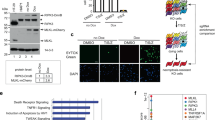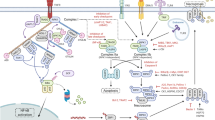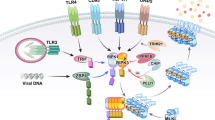Abstract
Arising from N. Narayan et al. Nature 492, 199–204 (2012)10.1038/nature11700
Sirtuins can promote deacetylation of a wide range of substrates in diverse cellular compartments to regulate many cellular processes1,2; recently, Narayan et al.3 reported that SIRT2 was required for necroptosis on the basis of their findings that SIRT2 inhibition, knockdown or knockout prevented necroptosis. We sought to confirm and explore the role of SIRT2 in necroptosis and tested four different sources of the SIRT2 inhibitor AGK2, three independent short interfering RNAs (siRNAs) against Sirt2, and cells from two independently generated Sirt2−/− mouse strains; however, we were unable to show that inhibiting or depleting SIRT2 protected cells from necroptosis. Furthermore, Sirt2−/− mice succumbed to tumour-necrosis factor (TNF)-induced systemic inflammatory response syndrome (SIRS) more rapidly than wild-type mice, whereas Ripk3−/− mice were resistant. Our results therefore question the importance of SIRT2 in the necroptosis cell death pathway.
This is a preview of subscription content, access via your institution
Access options
Subscribe to this journal
Receive 51 print issues and online access
$199.00 per year
only $3.90 per issue
Buy this article
- Purchase on Springer Link
- Instant access to full article PDF
Prices may be subject to local taxes which are calculated during checkout


Similar content being viewed by others
References
Houtkooper, R. H., Pirinen, E. & Auwerx, J. Sirtuins as regulators of metabolism and healthspan. Nature Rev. Mol. Cell Biol. 13, 225–238 (2012)
Sebastian, C., Satterstrom, F. K., Haigis, M. C. & Mostoslavsky, R. From sirtuin biology to human diseases: an update. J. Biol. Chem. 287, 42444–42452 (2012)
Narayan, N. et al. The NAD-dependent deacetylase SIRT2 is required for programmed necrosis. Nature 492, 199–204 (2012)
Cho, Y. S. et al. Phosphorylation-driven assembly of the RIP1–RIP3 complex regulates programmed necrosis and virus-induced inflammation. Cell 137, 1112–1123 (2009)
He, S. et al. Receptor interacting protein kinase-3 determines cellular necrotic response to TNF-α. Cell 137, 1100–1111 (2009)
Zhang, D. W. et al. RIP3, an energy metabolism regulator that switches TNF-induced cell death from apoptosis to necrosis. Science 325, 332–336 (2009)
Outeiro, T. F. et al. Sirtuin 2 inhibitors rescue α-synuclein-mediated toxicity in models of Parkinson’s disease. Science 317, 516–519 (2007)
Duprez, L. et al. RIP kinase-dependent necrosis drives lethal systemic inflammatory response syndrome. Immunity 35, 908–918 (2011)
Günther, C. et al. Caspase-8 regulates TNF-α-induced epithelial necroptosis and terminal ileitis. Nature 477, 335–339 (2011)
Piao, X. et al. c-FLIP maintains tissue homeostasis by preventing apoptosis and programmed necrosis. Sci. Signal. 5, ra93 (2012)
Welz, P. S. et al. FADD prevents RIP3-mediated epithelial cell necrosis and chronic intestinal inflammation. Nature 477, 330–334 (2011)
Beirowski, B. et al. Sir-two-homolog 2 (Sirt2) modulates peripheral myelination through polarity protein Par-3/atypical protein kinase C (aPKC) signaling. Proc. Natl Acad. Sci. USA 108, E952–E961 (2011)
Bobrowska, A., Donmez, G., Weiss, A., Guarente, L. & Bates, G. SIRT2 ablation has no effect on tubulin acetylation in brain, cholesterol biosynthesis or the progression of Huntington's disease phenotypes in vivo. PLoS ONE 7, e34805 (2012)
Murphy, J. M. et al. The pseudokinase MLKL mediates necroptosis via a molecular switch mechanism. Immunity 39, 443–453 (2013)
Wang, L., Du, F. & Wang, X. TNF-α induces two distinct caspase-8 activation pathways. Cell 133, 693–703 (2008)
Author information
Authors and Affiliations
Contributions
K.N., J.M.H., Z.S., D.R., S.A.-D., S.P., S.S., D.L.D. and C.H. designed and performed experiments and analysed data; J.A., P.V., D.R.G., A.A., V.M.D., W.J.K., A.S., A.D. and J.S. planned the project and performed data analysis; K.N., J.M.H., J.A., P.V., D.R.G., A.A., V.M.D., W.J.K., A.S., A.D. and J.S. wrote paper.
Corresponding author
Ethics declarations
Competing interests
Competing Financial Interests Declared none.
PowerPoint slides
Rights and permissions
About this article
Cite this article
Newton, K., Hildebrand, J., Shen, Z. et al. Is SIRT2 required for necroptosis?. Nature 506, E4–E6 (2014). https://doi.org/10.1038/nature13024
Received:
Accepted:
Published:
Issue Date:
DOI: https://doi.org/10.1038/nature13024
This article is cited by
-
Single-cell analysis of pyroptosis dynamics reveals conserved GSDMD-mediated subcellular events that precede plasma membrane rupture
Cell Death & Differentiation (2019)
-
Inhibition of RIPK1-dependent regulated acinar cell necrosis provides protection against acute pancreatitis via the RIPK1/NF-κB/AQP8 pathway
Experimental & Molecular Medicine (2019)
-
Emerging Roles of Sirtuins in Ischemic Stroke
Translational Stroke Research (2017)
-
Propagation of errors in citation networks: a study involving the entire citation network of a widely cited paper published in, and later retracted from, the journal Nature
Research Integrity and Peer Review (2016)
-
Intracellular nicotinamide adenine dinucleotide promotes TNF-induced necroptosis in a sirtuin-dependent manner
Cell Death & Differentiation (2016)
Comments
By submitting a comment you agree to abide by our Terms and Community Guidelines. If you find something abusive or that does not comply with our terms or guidelines please flag it as inappropriate.



